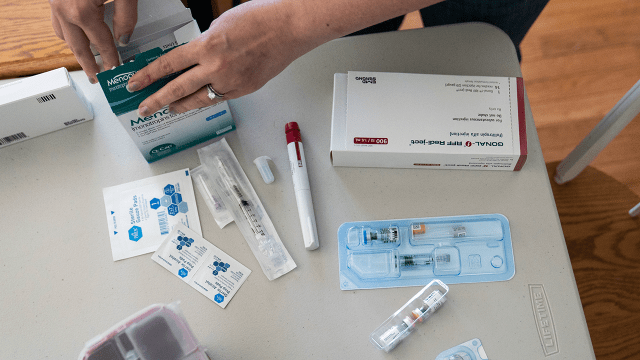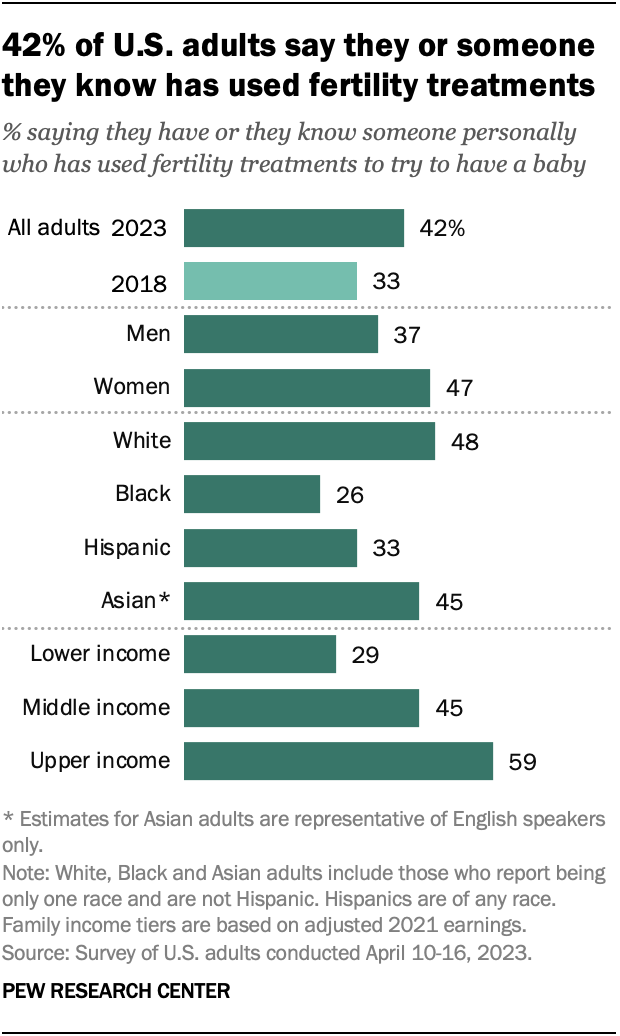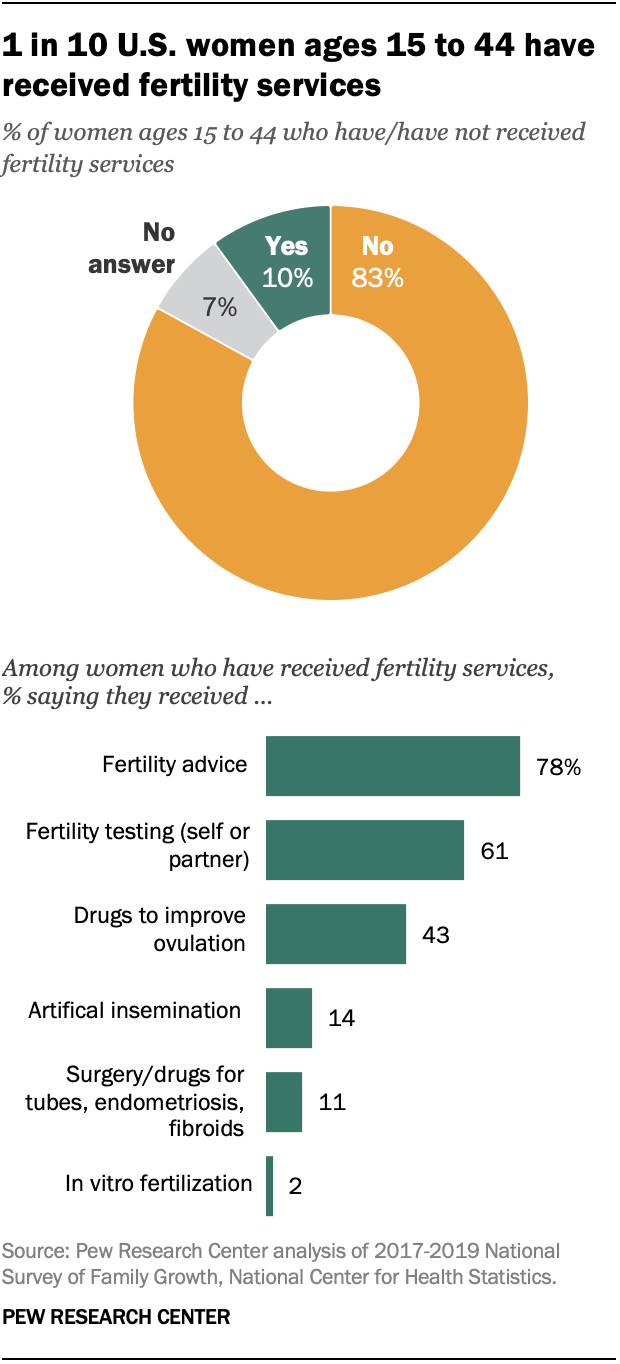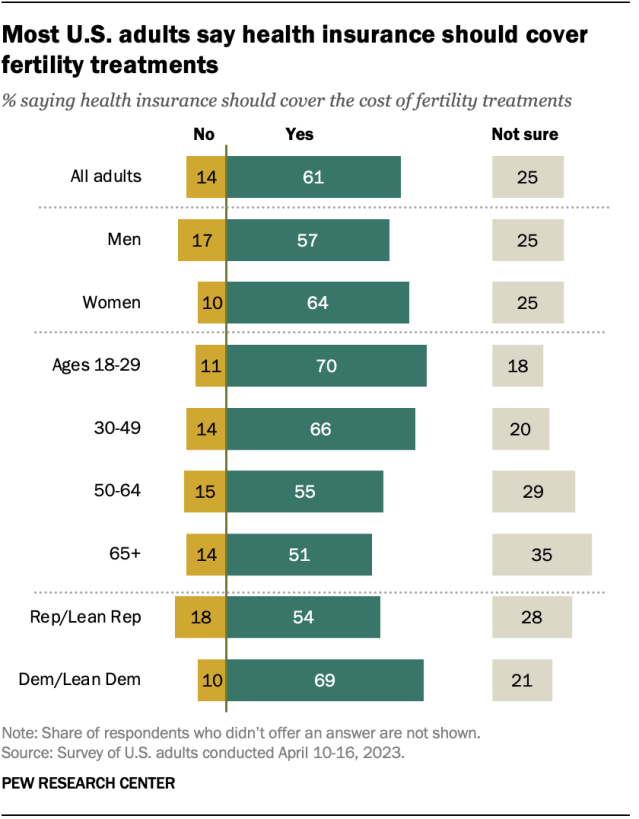
As the average age when women in the United States first give birth continues to rise, about four-in-ten adults (42%) say they have used fertility treatments or personally know someone who has. This is up from 33% five years ago, according to a new Pew Research Center survey.
Pew Research Center conducted this analysis to better understand Americans’ exposure to and experiences with fertility treatments. We surveyed 5,073 U.S. adults from April 10 to April 16, 2023. Everyone who took part in this survey is a member of the Center’s American Trends Panel (ATP), an online survey panel that is recruited through national random sampling of residential addresses. This way, nearly all U.S. adults have a chance of selection. The survey is weighted to be representative of the U.S. adult population by gender, race, ethnicity, partisan affiliation, education and other categories. Read more about the ATP’s methodology.
Fertility service estimates are based on data from the 2017-2019 National Survey of Family Growth (NSFG). The NSFG is conducted by the National Center for Health Statistics, which is part of the Centers for Disease Control and Prevention. Since 2002, the NSFG has developed a nationally representative sample of the civilian population of people of childbearing age.
Here are the Pew Research Center survey questions used for this analysis, along with responses, and the survey methodology.

The increase is driven in part by the rising share of White adults who say they’ve used fertility treatments or know someone who has. About half of White adults (48%) say this today, compared with 37% in 2018.
Experiences and familiarity with fertility treatments differ by:
- Race and ethnicity: White and Asian adults are the most likely to say they or someone they know has used fertility treatments. Some 45% of Asian adults say this. By comparison, about a quarter of Black adults (26%) and a third of Hispanic adults say the same.
- Gender: Women (47%) are more likely than men (37%) to say they or someone they know has used fertility treatments.
- Income: Upper-income adults are much more likely than middle- and lower-income adults to say they have used fertility treatments or know someone who has. This is not surprising because fertility treatments can be expensive and are not always covered by insurance. For example, the cost of one cycle of in vitro fertilization typically ranges from around $15,000 to $20,000.
What types of fertility services do women receive?

While the Center survey asks whether people have used fertility treatments or know someone who has, data from the Centers for Disease Control and Prevention (CDC) looks at the experiences of women who have personally used fertility services.
Between 2017 and 2019, 10% of American women ages 15 to 44 said they had received some form of fertility service. That share – which has remained relatively stable since the early 2000s – varies by age and educational attainment.
Women ages 35 to 44 are more likely than those younger than 35 to say they’ve used these services (18% vs. 7%).
In addition, women with a bachelor’s degree or more education are more likely than women with less education to have used fertility services (15% vs. 9%).
Among the 10% of women who have used any fertility service, the most commonly used type is fertility advice, with 78% saying they’ve received this. About six-in-ten (61%) say they’ve received fertility testing for themselves or their partner, and 43% say they’ve used drugs to improve ovulation.
More invasive procedures are used less often. Among those who have received any fertility service, 11% say they have had surgery or used drugs to resolve tube blockages, endometriosis or fibroids. Some 14% have used artificial insemination, and 2% have used in vitro fertilization.
Among all women ages 15 to 44, 1.1% have received artificial insemination or in vitro fertilization.
Should health insurance cover fertility treatments?

Most Americans (61%) say health insurance should cover the cost of fertility treatments, according to the new Center survey. Another 14% say health insurance should not cover these treatments, and 25% are not sure.
Majorities of men and women believe that health insurance should cover fertility services, though the share is higher among women (57% vs. 64%).
Adults ages 18 to 49 are more likely than those 50 and older to say that health insurance should cover fertility treatments.
Support is greater among Democrats and those who lean toward the Democratic Party than among Republicans and Republican leaners (69% vs. 54%). Republican women are notably more likely than Republican men to say that health insurance should cover fertility treatments (60% vs. 49%).
Some 70% of women who’ve received fertility services say that private insurance covered their treatment, according to CDC data.
Note: Here are the Pew Research Center survey questions used for this analysis, along with responses, and the survey methodology.



